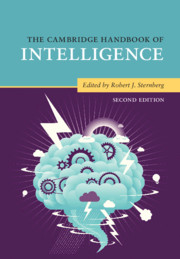Book contents
- The Cambridge Handbook of Intelligence
- The Cambridge Handbook of Intelligence
- Copyright page
- Dedication
- Contents
- Figures
- Tables
- Contributors
- Preface
- Part I Intelligence and Its Measurement
- 1 The Concept of Intelligence
- 2 A History of Research on Intelligence
- 3 A History of Research on Intelligence
- 4 An Alternative View on the Measurement of Intelligence and Its History
- 5 Factor-Analytic Models of Intelligence
- Part II Development of Intelligence
- Part III Intelligence and Group Differences
- Part IV Biology of Intelligence
- Part V Intelligence and Information Processing
- Part VI Kinds of Intelligence
- Part VII Intelligence and Its Role in Society
- Part VIII Intelligence and Allied Constructs
- Part IX Folk Conceptions of Intelligence
- Part X Conclusion
- Author Index
- Subject Index
- References
2 - A History of Research on Intelligence
Part 1: Pre–Twentieth-Century Origins in Philosophy
from Part I - Intelligence and Its Measurement
Published online by Cambridge University Press: 13 December 2019
- The Cambridge Handbook of Intelligence
- The Cambridge Handbook of Intelligence
- Copyright page
- Dedication
- Contents
- Figures
- Tables
- Contributors
- Preface
- Part I Intelligence and Its Measurement
- 1 The Concept of Intelligence
- 2 A History of Research on Intelligence
- 3 A History of Research on Intelligence
- 4 An Alternative View on the Measurement of Intelligence and Its History
- 5 Factor-Analytic Models of Intelligence
- Part II Development of Intelligence
- Part III Intelligence and Group Differences
- Part IV Biology of Intelligence
- Part V Intelligence and Information Processing
- Part VI Kinds of Intelligence
- Part VII Intelligence and Its Role in Society
- Part VIII Intelligence and Allied Constructs
- Part IX Folk Conceptions of Intelligence
- Part X Conclusion
- Author Index
- Subject Index
- References
Summary
In this chapter, I review the pre-twentieth-century philosophical origins of thinking about intelligence. I review work going back to Homer, and extending through Plato and Aristotle up to the work of John Stuart Mill. Many contemporary ideas about intelligence can be found to have their origins in early philosophical thinking. I also emphasize Mill’s point that intelligence, taken by itself, is not sufficient to guarantee a positive future for humankind.
- Type
- Chapter
- Information
- The Cambridge Handbook of Intelligence , pp. 18 - 30Publisher: Cambridge University PressPrint publication year: 2020
References
- 1
- Cited by

